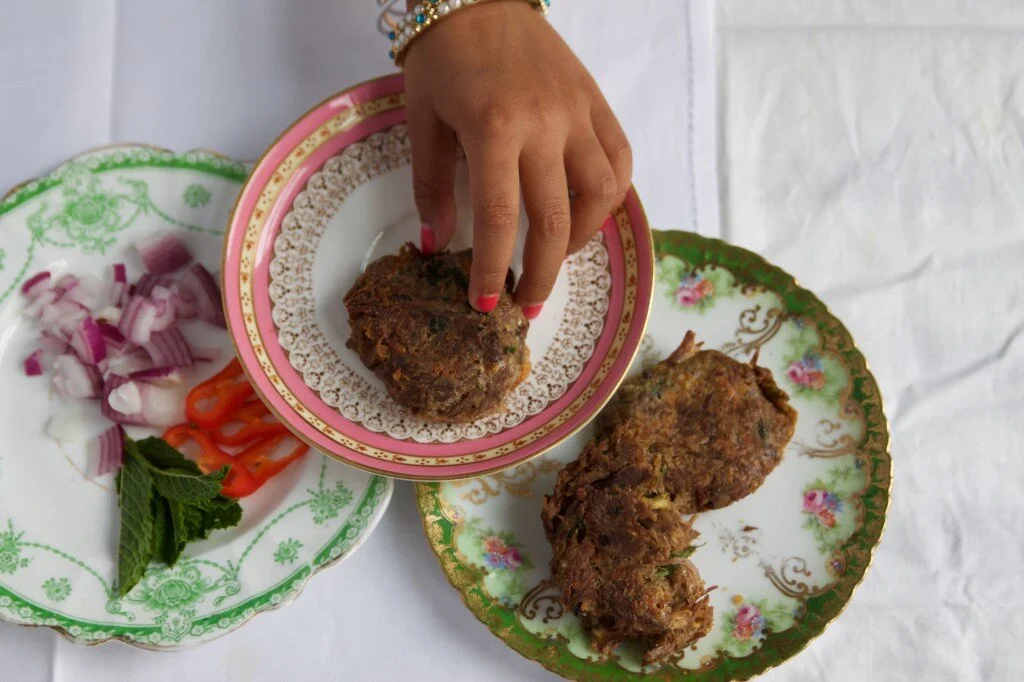Eid Lunch – for the Love of Family and Food

This article was commissioned by and published on the Great British Chefs website.
Eid will always remind me of my childhood and growing up in Pakistan. I have a clear sensory memory of awakening to aromas of cloves and cardamom wafting from the kitchen into my bedroom. This is a day that revolves around family togetherness and a celebration of food, after a month of abstinence and contemplation.
Though a global Muslim festival, Eid is celebrated differently in each country, highlighting the fact that this is not just a religious day but a time to rejoice our culture and identity. But, the one unifying similarity is that Eid is a celebration of food, authentic flavour and family togetherness.
As a child I would eagerly await Eid – we would receive money called ‘Eiddee’ in tiny colourful envelopes from older family and friends and I would always look forward to collecting my ‘kings ransom’ from my father, who would promise me this only if I woke up early, changed into my pretty new clothes and glass bangles!
Food took centre stage – from breakfast of seviyan, hot cardamom chai and jalebis (fried sweet sugar syrup doughnuts) and dahi baras (lentil fritters with yoghurt) made by my mother, followed by ‘elvensies’ of sheer khurma (hot sweet vermicelli saffron milk drink) at my Nani’s (maternal grandmother’s). Before lunch we would distribute food from our homes to the needy; this is a big part of the Eid culture in Pakistan, feeding those who may not be able to afford it themselves. Our lunch would always be at my Dadi’s (paternal grandmother’s), which always promised to be a lavish spread of biryani, shami kebabs, koftas, always ending with mithai (sweet meats) and her version of seviyan. A day of family visits, sitting together, being force fed an obscene amount of food, laughing and cherishing what is on our tables is how I would describe Eid in Pakistan.
To me, Eid is a moment of thankfulness – for the food we receive, for those who need it more than us and the loved ones in our lives. These recipes to me are the flavour of Eid lunch in Pakistan and ones I have adapted but still cook in the UK today.
Bavette Shami Kebabs with black cardamom, black cumin and cinnamon
Shami kebabs (pictured at the top of this blog post) are usually melt in the mouth pureed spiced meat and channa daal based kebabs, found in nearly all homes in Pakistan, with a history as far back as the Mughal Empire. Often a labourious task, I have adapted a traditional recipe and used bavette steak which is cheap and just beautiful, and instead of pureed mince beef – as traditional – I have left the meat to cook slowly until it pulls apart together with spices and channa daal. When bone dry, add cool fresh herbs and ginger and mould together into burger patties shapes, dip lightly in egg and shallow fry. Perfect Eid guest treats with some spiced tamarind chutney.
Makes 6-8 kebabs
Cooking time: 2-3 hours
Ingredients
400 g bavette steak
50 g channa daal (soaked for about 30 minutes to overnight before cooking)
1 cinnamon stick
2 black cardamom
1 tsp black cumin (or regular cumin if not available)
1 tsp coriander seeds
2 star anise
2-3 dried red chillis
1 tsp black peppercorn
8-10 cloves
½ inch piece ginger, chopped into tiny pieces
½ bunch coriander, chopped finely
20 mint leaves, chopped finely
2 green chillis, chopped finely
1 egg, beaten
Vegetable oil to shallow fry
Method
- Add the first 10 ingredients in a heavy based saucepan and add 1 ½ pints water. Bring to the boil and then return to a simmer, cover and leave to cook for about 3 hours on a low heat. Keep checking to make sure the meat doesn’t stick at the bottom, and ensure that you stir it occasionally. Do not add any more water
- After about 2 hours or so check to see if all the moisture is gone, the meat is tender and falling apart, and the lentil is mush
- Break and pull apart the meat, add the finely chopped ginger, chopped mint, coriander and green chillis. Mix until combined with the meat
- Take about 2 tbsp of the meat mixture and using your hand, form flat burger patties shapes to make the shami kebabs. Dip each into egg and set aside on a plate
- Heat vegetable oil in a shallow frying pan; once hot add about 3-4 shami kebabs into the pan, fry for about 1 minute each side until medium brown on either side
- Serve hot with any a hot sauce or ketchup
Pakistani festive beef biryani

This recipe is a labour of love, as is the Eid lunch- Cooking for those you love deserve such dedication.
Cooking time: 1 hour
Serves: 8-10 people
Ingredients
350 g basmati rice, washed, soaked for 30 minutes, parboiled and drained
5 tbsp vegetable oil
½ tbsp ghee
1 stick cinnamon
2 star anise
1 tsp black cumin
10 cloves
1 tsp coriander seeds
2 black cardamom
5 green cardamom
8 cloves
1 bay leaf
1 small piece mace
2 red onions, chopped finely
1 tsp each of grated ginger and crushed garlic
4 tomatoes, chopped roughly
1 tsp turmeric
½ tsp red chilli powder
400 g braising steak or beef chuck pieces
200 g Greek yoghurt
½ tsp saffron, steeped in 2 tbsp hot boiling water for 15 minutes
10 mint leaves
½ lemon, sliced
2 tsp rose water or kewra essence
½ tbsp melted ghee
2 green chillis
1 tbsp pistachios
10 edible dried rose buds or 1 tbsp edible dried rose petals
Method
- Begin by par boiling the soaked rice, drain and set aside. It should be firm but not entirely raw
- Heat a heavy based saucepan medium low, add the oil and ghee. When hot add all the whole spices and cook for 30 seconds, or until you can smell the oil aromatised by the spices
- Turn heat up to medium, add the red onions and fry until light golden, then add the ginger and garlic. Cook for 30 seconds, until the garlic no longer smells raw. Add tomatoes, and cook until the moisture of the tomatoes is gone (add about 1-2 tbsp for water if the tomatoes burn). The result should be a thick, rich sauce with no hard tomato bits and oil rising to the surface of the sauce. Add the turmeric and red chilli powder
- Next add the beef and stir fry until sealed (about 2-3 minutes). Add the Greek yoghurt and continue to stir fry until the moisture of the yoghurt evaporates and you are left with a sauce. Cover the pan and turn the heat to low
- Allow to cook until the sauce is thick reddish brown, with oil rising to the top. This will take a patient 15-20 minutes of cooking; you may need to add a little water if the meat isn’t cooked through. In this case cook covered for a few more minutes until the sauce is thick again
- Once the meat is cooked through, it’s time to layer the rice on top and infuse the aromatics of saffron, lemon, mint, green chilli and rose water or kewra. Layer the rice evenly on top of the meat
- Poke the aromatics into the rice, pour over the saffron and rose water or kewra, and then using a piece of foil cover the entire surface of the saucepan and place the lid firmly over to create a seal, so that the steam does not escape the pan. Turn the heat to its lowest setting and steam cook for 10 minutes. Once done, remove the foil and let the steam escape
- Mix the rice and meat with sauce gently using a dessert spoon so as to not break the rice
- Serve hot in a serving dish and scatter in pistachios and rose petals or buds
My Nani’s Muzaffar Seviyan served with clotted cream – sweet vermicelli with saffron and cardamom

There are many ways to make the quintessential Eid dessert called Seviyan. This is a sweet roasted vermicelli which can be made in either milk or water and sugar. The flavour is one that always reminds me of Eid and the excitement it brings. This is my maternal grandmother’s recipe, traditionally served with khoya (milk solids), but I also think clotted cream works equally well, giving it a British touch!
Serves: 6-8 people
Preparation time: 10 minutes
Cooking time: 10-15 minutes
Ingredients
2 tbsp ghee (clarified butter)
½ cup chopped pistachios
4-5 green cardamom seeds (discard husks)
1 ½ cups fine wheat vermicelli, crushed into small pieces
½ pint boiling hot water
½ tsp saffron, steeped in 1 tbsp boiling water for about 5 minutes
60 g caster sugar
Silver leaf to decorate (optional)
2 tbsp desiccated coconut to garnish
1 tbsp each of sultanas, slivered almonds and pistachios to garnish
100 g clotted cream
Method
- Heat the ghee in a wok style pan over medium heat and melt until hot. Add the chopped pistachios and cardamom seeds and stir-fry for 30 seconds. The cardamom should be fragrant and the pistachios very lightly brown. Turn the heat to medium low
- Add the crushed vermicelli and stir-fry until evenly light brown; this takes about 3-4 minutes of constant stir frying. The vermicelli will now smell toasted and the colour should be a medium brown
- Add the boiling water to the vermicelli together with the steeped saffron, mix until combined and cook until the vermicelli is tender and all the water is absorbed (about 3-4 minutes)
- Next sprinkle over the caster sugar, stir until dissolved (about 1-2 minutes)
- Turn heat off, and place in a serving dish. Decorate with silver leaf (optional), then serve warm topped with nuts, sultanas, coconut and clotted cream
(Keeps on its own for about 3-4 days covered, in a cool dry place)


